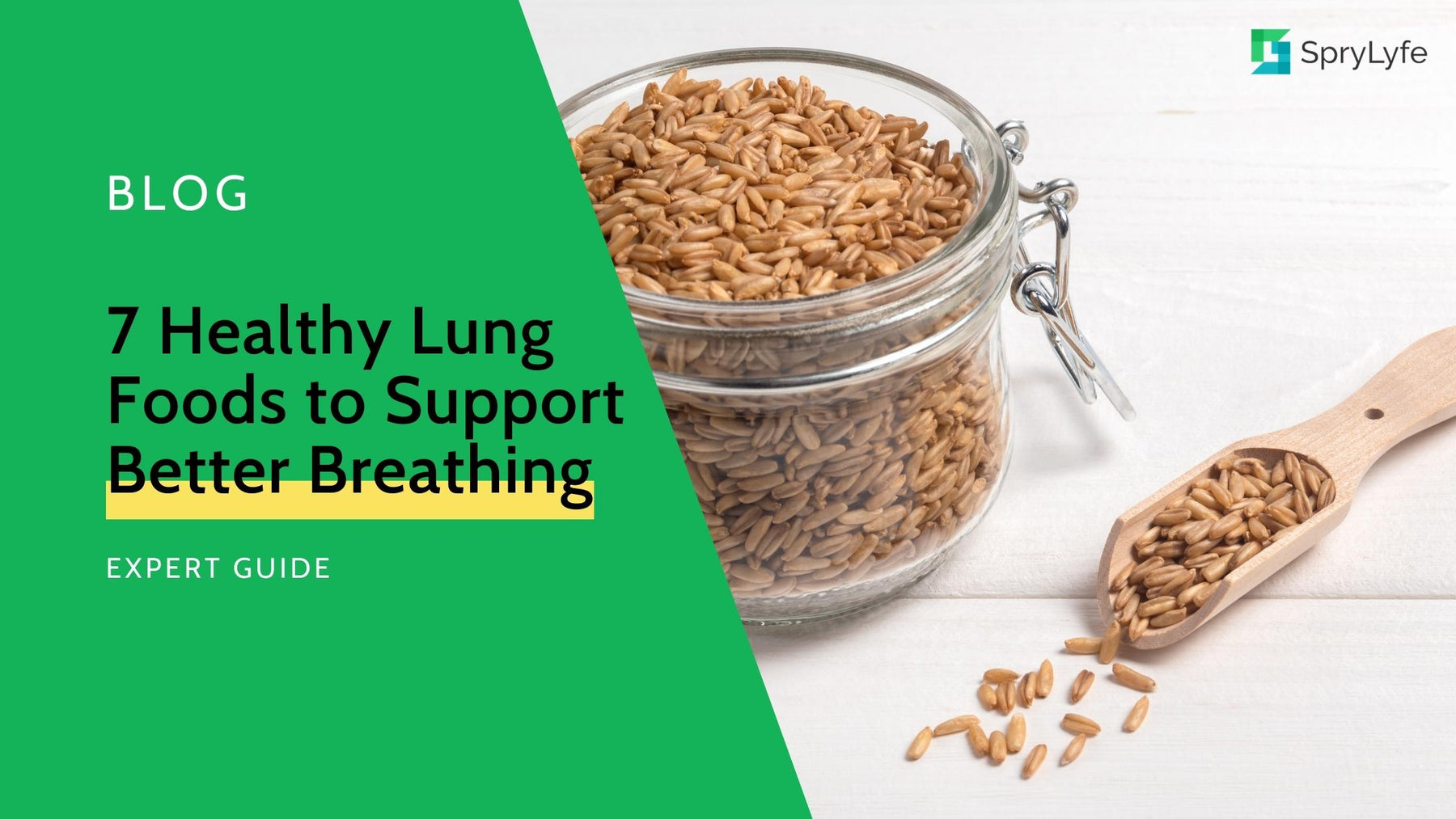
Healthy Lung Diet to Help You Breathe Better
Foods for lung health are essential for those with respiratory problems like COPD and asthma. Eating the right foods can help improve lung health, while avoiding certain unhealthy items may be necessary to reduce symptoms.
In this blog post, we will discuss which healthy lung food you should include in your diet as well as what you should avoid to support better lung function.
We’ll also cover herbs and spices that are beneficial for breathing issues along with vitamins and minerals needed for healthy lungs, and some lifestyle changes will be discussed so readers can take charge of their own overall wellbeing when it comes to their lungs' health.
Foods to Help Improve Lung Health
Fruits and Vegetables
Eating a variety of fruits and vegetables is essential for healthy lungs. Fruits and vegetables are packed with antioxidants, which can help reduce inflammation in the lungs.
Examples of antioxidant-rich foods include blueberries, apples, oranges, kale, spinach, broccoli, carrots, sweet potatoes and tomatoes. Aim to eat at least five servings of fruits and vegetables each day for optimal lung health.
Whole Grains
Whole grains provide essential vitamins and minerals that support overall health as well as healthy lung function.
Examples of whole grains include oats, quinoa, brown rice and barley. Try to incorporate at least three servings of whole grains into your daily diet for improved lung health.
Healthy Fats
Healthy fats such as olive oil can also help reduce inflammation in the lungs while providing essential nutrients like omega-3 fatty acids that are important for good health overall.
Other sources of healthy fats include nuts (such as almonds or walnuts), avocados and seeds (like chia or flax). Aim to consume about two tablespoons per day for optimal benefits on your lung health
Eating a balanced diet of fruits, vegetables, whole grains and healthy fats can help improve lung health. Now let's take a look at the foods to avoid for better lung health.
Foods to Avoid for Better Lung Health
Processed Meats
Processed meats such as bacon, hot dogs, and sausage should be avoided when trying to maintain healthy lungs. These foods contain high levels of sodium which can lead to fluid retention.
Refined Sugars and Carbs
Refined sugars and carbs like white breads, pastries, candy bars, chips, etc., should also be avoided for better lung health. Eating these types of food may cause inflammation which can worsen symptoms associated with respiratory diseases.
It is best to opt for complex carbohydrates such as whole grains instead since they provide more fiber and essential nutrients that help support a healthy immune system.
Trans Fats
Trans fats, found in many processed foods like margarine spreads, fried fast-foods, store-bought baked goods (cookies/cakes), and microwave popcorn bags should also be avoided when trying to maintain good lung health due to their negative effects on the body’s inflammatory response system.
Studies suggests that trans fats increase the risk of developing certain chronic diseases so it is important to limit your intake of these unhealthy fats whenever possible
Eating unhealthy foods can worsen respiratory issues, so it's important to avoid processed meats, refined sugars and carbs, and trans fats for better lung health. Herbs and spices are also thought to improve lung function; let's look at some of the best ones now.
Herbs and Spices for Improved Lung Function
Turmeric is a popular spice that has been used for centuries in traditional Indian medicine. It contains curcumin, an active ingredient with anti-inflammatory properties that may help reduce swelling in the airways and improve lung function.
Animal studies have shown that turmeric may lessen symptoms related toCOPD and asthma. More research is needed to elucidate its effect in humans.
Ginger is another herb thought to reduce mucus production in the lungs. It is believed that ginger can also help reduce inflammation of the respiratory system, as well as reducing symptoms such as coughing and wheezing. Ginger tea or capsules are easy ways to get your daily dose of this powerful herb.
Garlic is believed to have anti-inflammatory effects on the respiratory system due to its high levels of sulfur compounds called allicin which act as natural antibiotics against bacteria and viruses.
Eating garlic regularly is thought to help improve lung health by reducing inflammation and improving immunity against infections like colds or flu. Garlic can be added to many dishes or taken in supplement form for maximum benefit
Herbs and spices are also thought to improve lung function, but it is important to also focus on other vitamins and minerals for optimal health. Next, we will look at how vitamins and minerals can help support healthy lungs.
Vitamins and Minerals for Healthy Lungs
Vitamin C is an essential nutrient for healthy lungs. It helps boost immunity by fighting off infections that could affect the lungs, such as colds and flu. Eating foods high in vitamin C like oranges, grapefruits, kiwi fruit, strawberries, bell peppers and broccoli are great ways to get your daily dose of this important vitamin.
Vitamin D3 is another important nutrient for lung health. It helps regulate calcium levels which may contribute to proper breathing function. Vitamin D3 can be found naturally in fatty fish like salmon and tuna as well as fortified dairy products such as milk and yogurt or it can be taken in supplement form if needed.
Including vitamins and minerals in your diet is essential for your overall health, including your lungs. Dairy products are also a great source of nutrients that can help support lung health, so let's take a look at some dairy options to consider.
Dairy Products for Healthy Lungs
Yogurt is a great source of probiotics which preliminary findings suggest may help reduce inflammation in the airways associated with respiratory diseases like asthma or COPD.
Probiotics are beneficial bacteria that help keep your gut healthy and promote better digestion. It also contains essential vitamins such as A & B12, which helps support the immune system.
Cheese is a good source of calcium which helps keep bones strong including those in your chest wall that support breathing muscles. It also contains protein, which helps build muscle mass throughout the body - both of which are important for people with respiratory issues who may struggle to maintain their strength due to limited activity levels or difficulty breathing during exercise.
Cheese is another good source of calcium and it also contains casein proteins. Cheese also provides vitamin K2, which helps regulate blood clotting. Dairy products such as yogurt, milk and cheese can provide important nutrients to support healthy lungs. Moving on, we'll discuss some drinks that are beneficial for lung health.
Drinks to Support Healthy Lungs
Green Tea
Green tea is a great choice for those looking to support their lung health. It contains polyphenols, which are powerful antioxidants that help fight off free radicals. To get the most out of your cup of green tea, try adding some honey or lemon juice for added flavor and benefits.
Herbal Teas
Herbal teas may also be beneficial for lung health due to their calming effects on the body. Many herbs have anti-inflammatory properties that may help soothe irritated airways and make breathing easier. Popular herbal teas include chamomile, peppermint, ginger root, licorice root and eucalyptus leaf.
Aim for at least 8 glasses of water per day (more if you’re active) and consider adding some lemon slices or mint leaves into your glass as an extra boost. This will help keep your airways hydrated so they don’t become irritated or inflamed due to dryness or allergens in the environment, making it easier to clear out any irritants that could be causing problems with your breathing function.
Drinks like green tea, herbal teas and water are all beneficial for overall health, including the lungs. Now let's look at lifestyle changes you can make to improve your lung health.
Lifestyle Changes for Better Lung Health
Quit Smoking
Quitting smoking is one of the most important lifestyle changes you can make for better lung health. Not only does it reduce your risk of developing chronic respiratory diseases like COPD, but it also helps to improve your overall well being and breathing capacity.
If you’re a smoker, quitting is not easy, but there are many resources available to help you quit such as nicotine replacement therapy or counseling services.
Read more about the difference between healthy lungs and a smoker's lungs here.
Exercise Regularly
Exercise is an essential part of maintaining healthy lungs and improving breathing capacity. Regular exercise strengthens your breathing muscles and increases oxygen intake which helps to keep your lungs functioning properly.
Aim for at least 30 minutes of moderate physical activity each day such as walking, running, swimming or cycling – whatever works best for you.
High levels of stress can have a negative impact on our bodies, including our lungs. It is important to take time out from busy schedules and focus on activities that help reduce stress levels such as yoga or meditation.
Additionally, getting enough sleep every night will help ensure that your body has the energy it needs to stay healthy and function properly throughout the day.
Read more tips on how to have healthy lungs here.
FAQs in Relation to Healthy Lungs Food
What drink is good for the lungs?
Water is the best drink for healthy lungs. It helps to keep mucous membranes moist, which can help reduce inflammation and improve breathing. Other beneficial drinks include herbal teas such as green tea, ginger tea or chamomile tea; these are known to have anti-inflammatory properties that may help reduce lung inflammation. Lastly, drinking fresh fruit juices like apple juice or cranberry juice can also provide antioxidants and other nutrients that may benefit lung health.
Which fruit is best for lungs?
Apples are one of the best fruits for your lungs. Apples contain antioxidants that may help reduce inflammation in the airways, which can improve breathing and lung function. They also contain Vitamin C, which helps to strengthen the immune system and protect against respiratory infections. Apples are low in calories and high in fiber, making them a great snack choice for people with COPD or asthma who need to watch their weight. Additionally, apples may help reduce mucus production in the lungs due to their anti-inflammatory properties.
How can I strengthen my lungs?
Strengthening your lungs is possible with a few simple steps. First, quit smoking and avoid secondhand smoke. This will reduce inflammation in the airways and help improve lung function. Secondly, exercise regularly to increase oxygen intake and strengthen respiratory muscles.
Additionally, practice deep breathing exercises such as diaphragmatic breathing or pursed lip breathing to improve lung capacity. Finally, eat a healthy diet full of fruits and vegetables for essential vitamins that can support better lung health. With these tips you can start improving your lung health today.
Conclusion
In conclusion, eating healthy foods for your lungs is an important part of maintaining good lung health. Eating a variety of fruits and vegetables, avoiding processed foods, incorporating herbs and spices into your diet, getting enough vitamins and minerals from whole foods sources, consuming dairy products in moderation and drinking plenty of water are all great ways to help keep your lungs functioning at their best.
Moreover, making lifestyle changes such as quitting smoking or reducing air pollution exposure can also have a positive impact on your lung health. Taking the time to focus on these tips will help you breathe easier for years to come.
Written by Andy Flynn

|
Andy Flynn is the founder of Sprylyfe, the leading retailer of portable oxygen concentrators in the United States. He also co-founded ARYA BioMed. Get to know him on LinkedIn. |
Medically Reviewed By Aaron Gravely, M.D.

|
Aaron L. Gravely, M.D. is a professional medical writer and physician-scientist with over 8 years of experience in healthcare and medical research. Get to know him on LinkedIn or read his published works. |


Leave a comment